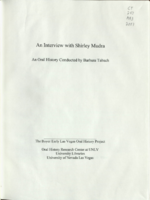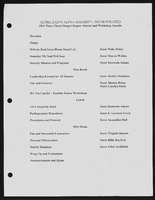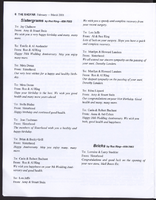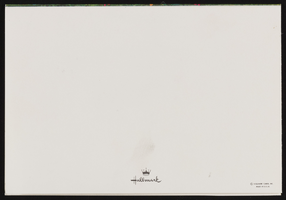Search the Special Collections and Archives Portal
Search Results

Transcript of interview with Shirley Mudra by Barbara Tabach, November 30, 2011
Date
Archival Collection
Description
When Shirley Mudra arrived in Las Vegas in 1966, she came tearfully. But as the wife of a Nevada Test site manager and mother of three young children, she was accustomed to adapting. Indeed, she adapted and remains a Las Vegas resident. Shirley and her husband Paul (above photo) met while both were in the Air Force. She was the daughter of a Pittsburgh, Pennsylvania, homemaker and railroad worker and describes her upbringing. She also talks about her joy of enlistment in the Air Force and the transition to being a wife, mother and her employment at the Department of Energy. Shirley's narrative includes details of early Las Vegas life, raising children here and becoming part of the changing community through friendships.
Text

Transcript of interview with Stephen La Thair Hawley by Donna Mattson, June 24, 1975
Date
Description
On June 24, 1975, collector Donna Mattson interviewed native Nevadan mechanic, Stephen La Thair Hawley, (born October 15th, 1936, in Ely, Nevada) in his home in Las Vegas, Nevada. This interview offers a historical overview of early Las Vegas including gambling and an in-depth discussion on local economic, environmental, and social changes.
Text

Transcript of interview with Ruth Hazard by John Neal, March 8, 1975
Date
Archival Collection
Description
On March 8, 1975, John Neal interviews Ruth Hazard (birthdate unknown, 67 years old) in her home about her memory of how Southern Nevada has changed economically. Hazard goes in-depth about her knowledge of municipal politics and her husband’s friendships with a number of Nevadan politicians. Hazard also briefly talks about her fascination with the above-ground atomic tests, speakeasies during Prohibition, and local anxieties about Las Vegas “losing its identity.”
Text

Transcript of interview with Dan Hill by John Bennett, March 1, 1979
Date
Archival Collection
Description
On March 1, 1979, John L. Bennett interviewed Dan Hill (born May 20, 1914 in Illinois) in his home at 2130 Walnut Road, Las Vegas, Nevada, about his memory of Southern Nevada. In addition to the collector and informant, there is an unidentified woman present during the interview. Hill explains that he originally came to Nevada in search of work. He briefly moved to Europe during the First World War where he served in the Army; at the end of the war, Hill returns to Las Vegas to work at the Nevada Test Site. Hill then goes in-depth about his experience as a worker at the Nevada Test Site and different mining sites that he had also worked at. The two briefly discuss the different sheriffs that had been in charge of Las Vegas, and how many people came to Las Vegas to work at the Henderson Magnesium Plant and Hoover Dam in addition to the Nevada Test Site.
Text

Transcript of interview with Hugh E. Key by Bob Bush, February 21, 1980
Date
Archival Collection
Description
On February 21, 1980, collector Bob Bush interviewed porter and retired military man, Hugh E. Key (born on November 17th, 1919 in Fordyce, Arkansas) in Las Vegas, Nevada. This interview covers the life of a Las Vegas old-timer. Hugh Keys’ wife, Mrs. Key, is also present during the interview and offers a few remarks.
Text

Alpha Kappa Alpha Sorority, Theta Theta Omega Chapter retreat: agenda and meeting documents
Date
Archival Collection
Description
From the Alpha Kappa Alpha Sorority, Incorporated, Theta Theta Omega Chapter Records (MS-01014) -- Chapter records file.
Text

Anthony Kappenman oral history interview: transcript
Date
Archival Collection
Description
Oral history interview with Anthony Kappenman conducted by Claytee D. White on May 16, 2019 for the Remembering 1 October Oral History Project. Kappenman begins the interview by talking about his early life, childhood, work, and his time in the military. Afterwards, he recalls what he did on October 1, 2017 prior to the Route 91 festival and during the shooting. He describes his journey trying to escape the area, arriving at the airport injured, and his stay in the hospital. Then, Kappenman talks about how he felt about the way the city and first responders had responded during the shooting, and how the community united afterwards. Lastly, he talks about his opinions on gun control, his recovery, and how he felt after the shooting.
Text


